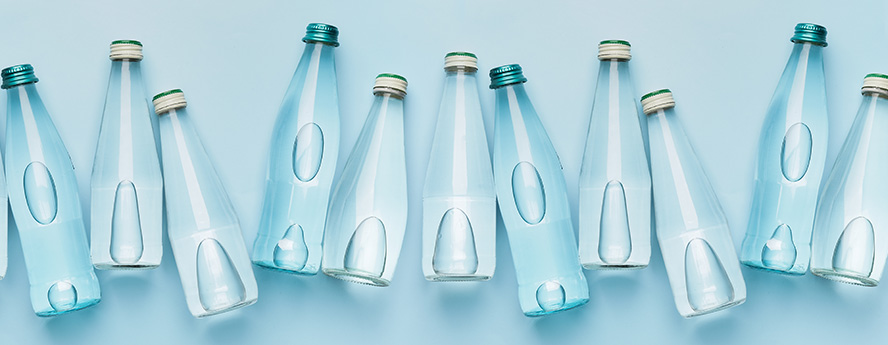
According to a UK poll from 2021, around 40% of respondents believe they do not drink enough water to reach the recommended fluid intake of 6-8 glasses per day. However, water is essential for our health and well-being as it supports many biological functions and provides a foundation for most reactions in the body. Water in our bodies is important for:
- Cell function
- Joints and eye lubrication
- Transportation of nutrients and waste
- Body temperature regulation
Water is considered the main source of fluid, but have you ever wondered what the difference is between two of the main sources of water, mineral water, and spring water? In this article, we will explore the key differences between natural mineral water and spring water.
What are the similarities between natural mineral water and spring water?
Natural mineral water and spring water are often confused with each other. This may be because they:
- both are types of bottled water,
- both must come from a natural underground source,
- both contain minerals which occur naturally,
- both must be bottled at the source,
- both are safe to drink.
What are the differences between natural mineral water and spring water?
Although natural mineral water and spring water are similar, they do have some differences which determine their classification.
What is natural mineral water?
Natural mineral water is a type of bottled water that naturally contains minerals and trace elements such as calcium, magnesium, potassium and zinc. Below are standards that water must achieve to be classed as natural mineral water.
- Keep its original purity, meaning its mineral properties remain the same throughout the process from source to bottling.
- Demonstrate a stable composition that is clearly labelled on the packaging.
- Strictly follows treatment rules specific to natural mineral water.
- Be officially recognised by the respective local authority.
What is spring water?
Spring water is a type of bottled water that comes from an underground source through a tapped or natural exit and is bottled at the source. Below are standards that water must achieve to be classed as spring water.
- Be tested to make sure it complies with chemical, microbiological, and radioactive limits.
- Be collected with equipment that prevents contamination and doesn’t change the properties of the water.
- Be bottled in containers with caps or lids.
Natural mineral water and spring water can have different mineral content
The mineral content in both natural mineral water and spring water can vary depending on the source and treatments, however, the mineral content must be naturally occurring and it can not be added afterwards. This does come with an exception as you are able to add carbon dioxide when producing sparkling natural mineral water.
Natural mineral water and spring water usually contain:
- Sodium – which helps maintain proper fluid balance in the body and supports nerve and muscle function.
- Calcium – which helps to build and maintain strong bones and teeth.
- Magnesium – which helps turn food into energy in our body and supports bone health.
- Potassium – which helps maintain normal levels of fluid inside our cells.
Bottled water can also contain fluoride, but if the water contains too much of this mineral, producers must remove some of it through treatment. If water contains more than 1.5 mg of fluoride per litre, the content must be put on the label as this water is no longer suitable for regular consumption by children 7 years old or younger.
It is important to know that water only provides some of the minerals our bodies need daily. Eating a healthy, balanced diet will help you achieve the full amount of minerals you require.
Here are some examples of what water can provide vs what we need:
|
Mineral |
Per litre, natural mineral water can contain* |
Per litre, spring water can contain** |
Every day, an adult needs |
|
Sodium |
24mg |
5.6mg |
no more than 2,400mg |
|
Calcium |
55mg |
40.5mg |
|
|
Magnesium |
19mg |
10.1mg |
|
|
Potassium |
1mg |
0.7mg |
*based on 1 litre of Buxton Still Mineral Water **based on 1 litre of Highland Spring Still Water
Natural mineral water and spring water can have different tastes and consistencies
Different mineral compositions can affect the taste and consistency of water. For example, a high concentration of calcium and magnesium can contribute to the hardness of water.
Natural mineral water and spring water have different label regulations
Natural mineral water should always provide its mineral content on the label and spring water often has this information on the label too, although producers of spring water are not required to do so.
Is spring water better for you than mineral water?
Both natural mineral water and spring water can be healthy drinking options as they are free from contaminations and must undergo specific drinking water regulations before reaching the shelves. Which one you choose depends on your individual needs and preferences. However, it is important to note that the specific benefits and properties of each type of water can vary depending on its source and composition, therefore you should read the labels before choosing which water is right for you.
Mineral water vs spring water: The bottom line
In conclusion, both mineral water and spring water are excellent choices for providing some of the essential minerals that our bodies need to keep us healthy. While the precise mineral composition depends on factors such as the water source and how it was treated, any water that has been classified as safe for drinking is a good option to keep us hydrated.
For further reading, why not take a look at our related article Natural mineral water vs tap water.
The content of this website is provided for informational purposes only and does not substitute the advice of a professional.